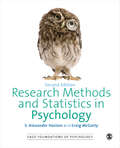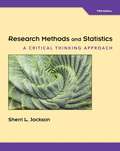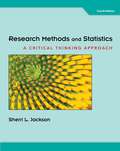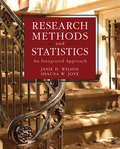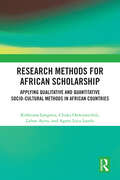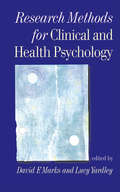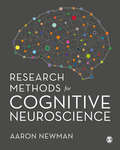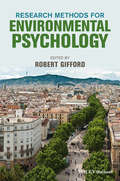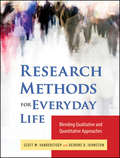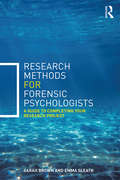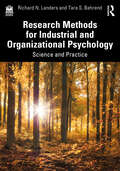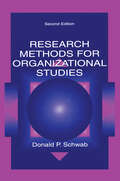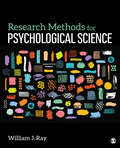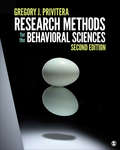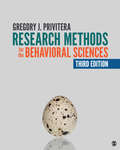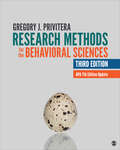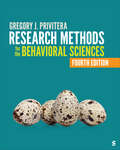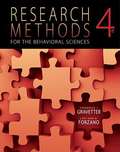- Table View
- List View
Research Methods and Statistics in Psychology (SAGE Foundations of Psychology series)
by S Alexander Haslam Craig Mcgarty'The strength of this book is in the determined approach it takes to helping the reader learn the subject matter by the inclusion of explanations of key terms and exercises. If coupled with tutorial support, this will encourage students to work harder at the subject matter - always a challenge in what many students perceive as the least accessible and interesting part of psychology. It is well worth considering as a core methods text for undergraduates or for masters students new to psychology'- John Hegarty, Times Higher Educational Supplement, Textbook Guide Research Methods and Statistics in Psychology is an accessible introduction to the principal research methods and statistical procedures that underpin psychological research. With a broad range of support materials and features it is the ideal textbook to accompany both a first and second year course. Key features of this new textbook: - Accompanying website: an interactive resource for both both teachers and students including powerpoint slides of lecture notes, self-test multiple choice questions and answers for students as well as other on-line features. To access these please click on the Companion Website logo above - Coverage of the full research process in psychology from the ground up, addressing issues to do with research goals, problem definition and hypothesis, methodological choices and strategy and ethical controversies. - Complete coverage of the key quantitative and qualitative methods now recognised in psychology. - A host of textbook features including checklists of research evaluation and improvement, discussion questions and exercises; and annotated further reading at the end of every chapter. - Appendices in the back of the textbook in conjunction with the accompanying website - step-by-step guide to performing key statistical tests and a guide to writing up experiments and reports in psychology. Research Methods and Statistics in Psychology is a comprehensive and student-friendly introductory textbook that deals with psychological research issues in depth, but which places an emphasis on the conceptual and practical skills necessary to become a good researcher.
Research Methods and Statistics: A Critical Thinking Approach (5th Edition)
by Sherri L. JacksonRESEARCH METHODS AND STATISTICS: A CRITICAL THINKING APPROACH, 5th Edition, successfully illustrates the integration between statistics and research methods by demonstrating the ways to use statistics in analyzing data collected during research. Jackson's combined text adopts an inviting narrative style that speaks directly to students and draws them into the material, helping them overcome the initial apprehension they may feel at having to learn both subject areas at once. Focusing on the logic of the process and the methodology aspect of research, Jackson incorporates a student-friendly critical-thinking approach and presents examples and exercises to which students can relate.
Research Methods and Statistics: A Critical Thinking Approach,Fourth Edition
by Sherri L. JacksonRESEARCH METHODS AND STATISTICS: A CRITICAL THINKING APPROACH, 4e, successfully illustrates the integration between statistics and research methods by demonstrating the ways to use statistics in analyzing data collected during research. Jackson's combined text adopts an inviting narrative style that draws you into the material, helping you overcome the initial apprehension you may feel at having to learn both subject areas at once. She incorporates a student-friendly critical-thinking approach and presents examples and exercises to which you can relate. Jackson focuses on the logic of the process and the methodology aspect of research.
Research Methods and Statistics: An Integrated Approach
by Janie H. Wilson Shauna W. JoyeThis innovative text offers a completely integrated approach to teaching research methods and statistics by presenting a research question accompanied by the appropriate methods and statistical procedures needed to address it. Research questions and designs become more complex as chapters progress, building on simpler questions to reinforce student learning. Using a conversational style and research examples from published works, this comprehensive book walks readers through the entire research process and includes ample pedagogical support for SPSS, Excel, and APA style.
Research Methods and Statistics: An Integrated Approach
by Janie H. Wilson Shauna W. JoyeThis innovative text offers a completely integrated approach to teaching research methods and statistics by presenting a research question accompanied by the appropriate methods and statistical procedures needed to address it. Research questions and designs become more complex as chapters progress, building on simpler questions to reinforce student learning. Using a conversational style and research examples from published works, this comprehensive book walks readers through the entire research process and includes ample pedagogical support for SPSS, Excel, and APA style.
Research Methods for African Scholarship: Applying Qualitative and Quantitative Socio-cultural Methods in African Countries
by Chuka Onwumechili Kehbuma Langmia Laban Ayiro Agnes Lucy LandoThis book spotlights and demystifies under-researched elements of research design to support successful research initiatives undertaken by students in African universities.This volume marks a significant and important departure from research design books rooted in European and American socio-cultural context and places emphasis on contextual realities in Africa. Attending to socio-cultural oral and written methods of eliciting data from participants, contextual sampling techniques, oral and third-party open ended survey instrumentation, and multi-pronged data analysis schemes that emphasize ontological, epistemological, and axiological findings, these chapters constitute a novel and much-needed focus on realities and examples from the continent of Africa.Written by African scholars, the book will appeal to post-graduate students and early-career scholars and researchers with interests in research methods across the social sciences.
Research Methods for Clinical and Health Psychology
by David F. Marks Lucy Yardley`If you are teaching postgraduate research methods courses, including those aimed at a mixture of psychologists and other health professionals, this book is worth considering as a core text′ - John Hegarty, THES This textbook offers an excellent introduction to the variety of research methods used within the fields of clinical and health psychology. The book provides a detailed, yet concise, explanation of both qualitative and quantitative approaches and draws upon case-study examples to illustrate how these can be used in a variety of health-care settings, with special relevance to clinical disorders, disease prevention and health promotion. Key features of the book include: - A clear and concise narrative - Real-life case studies and examples drawn from clinical practice. - Revision questions in each chapter - Boxes, diagrams and tables to highlight key points - Chapter outlines, summaries and a glossary of useful terms to help students and researchers with independent study and learning. Research Methods for Clinical and Health Psychology fulfils the demand for a textbook explaining how qualitative and quantitative methods can be used explicitly in a health psychology context. It will be invaluable reading for clinical and health psychology students, trainees and practitioners, as well as those in nursing, medical and other healthcare departments taking an advanced psychology option.
Research Methods for Cognitive Neuroscience
by Dr. Aaron NewmanThis fresh, new textbook provides a thorough and student-friendly guide to the different techniques used in cognitive neuroscience. Given the breadth of neuroimaging techniques available today, this text is invaluable, serving as an approachable text for students, researchers, and writers. This text provides the right level of detail for those who wish to understand the basics of neuroimaging and also provides more advanced material in order to learn further about particular techniques. With a conversational, student-friendly writing style, Aaron Newman introduces the key principles of neuroimaging techniques, the relevant theory and the recent changes in the field.
Research Methods for Cognitive Neuroscience
by Dr. Aaron NewmanThis fresh, new textbook provides a thorough and student-friendly guide to the different techniques used in cognitive neuroscience. Given the breadth of neuroimaging techniques available today, this text is invaluable, serving as an approachable text for students, researchers, and writers. This text provides the right level of detail for those who wish to understand the basics of neuroimaging and also provides more advanced material in order to learn further about particular techniques. With a conversational, student-friendly writing style, Aaron Newman introduces the key principles of neuroimaging techniques, the relevant theory and the recent changes in the field.
Research Methods for Environmental Psychology
by Robert GiffordCovering the full spectrum of methodology, the timely and indispensible Research Methods for Environmental surveys the research and application methods for studying, changing, and improving human attitudes, behaviour and well-being in relation to the physical environment. The first new book covering research methods in environmental psychology in over 25 years. Brings the subject completely up-to-date with coverage of the latest methodology in the field The level of public concern over the impact of the environment on humans is high, making this book timely and of real interest to a fast growing discipline Comprehensively surveys the research and application methods for studying, changing, and improving human attitudes, behavior, and well-being in relation to the physical environment Robert Gifford is internationally recognised as one of the leading individuals in this field, and the contributors include many of the major leaders in the discipline
Research Methods for Everyday Life
by Deidre D. Johnson Scott W. VanderstoepThis book offers an innovative introduction to social research. The book explores all stages of the research process and it features both quantitative and qualitative methods. Research design topics include sampling techniques, choosing a research design, and determining research question that inform public opinion and direct future studies. Throughout the book, the authors provide vivid and engaging examples that reinforce the reading and understanding of social science research. "Your Turn" boxes contain activities that allow students to practice research skills, such as sampling, naturalistic observation, survey collection, coding, analysis, and report writing.
Research Methods for Forensic Psychologists: A guide to completing your research project
by Sarah Brown Emma SleathResearch Methods for Forensic Psychologists is an accessible and comprehensive textbook that introduces students to the research process in forensic psychology. Adopting a problem-based learning approach, this book offers a ‘how-to’ guide to the whole research process and empowers readers to develop their own programme of research, from initial vague ideas, to developing a research question, to carrying out a methodologically rigorous research project, to disseminating the findings. The text is centred on five case studies, sufficiently different in nature to address the most common research methodologies. Each case study is linked with a specific research question that will be used to illustrate the research process throughout the rest of the book. Topics covered in the book include: Design and Planning, including a literature search, a discussion of different sorts of data, practical and feasibility issues, research ethics and developing a research proposal. Conducting research, including the submission of ethics proposals and responding to feedback, collecting data and dealing with the problems and challenges of analysing data. Dissemination of findings, an overview of the different types of papers, with examples listed and other methods of disseminating findings discussed, such as conference presentations and the use of social media. Throughout, issues of common difficulty or confusion are highlighted and activities are provided for readers to consider and apply the information discussed further. Additional reading sections and summaries are also provided at the end of each chapter. This book is essential reading for advanced students in Forensic Psychology, as well as trainees and practitioners within relevant forensic psychology organisations.
Research Methods for Industrial and Organizational Psychology: Science and Practice
by Richard N. Landers Tara S. BehrendThis important and useful book offers a clear and comprehensive foundation for research methods in industrial and organizational (I-O) psychology. The text provides readers with a key understanding of the research, theory, and practice needed towards becoming a research methods expert.The use of trustworthy and rigorous research methods is foundational to advancing the science of industrial and organizational psychology and its practice in the field. Understanding this, the authors have paired straightforward, plainly written explanations in a conversational tone with illuminating diagrams and illustrations. Many descriptions are followed by in-depth demonstrations and examples from relevant software, including SPSS, R, and even Excel when it’s the best option available. Insightful and accessible, the text covers the full gamut of I-O research methods, from theory to practice and everywhere between.Paired with a detailed instructor’s manual, this book serves as a gentle but thorough introduction to the complex world of research methods in I-O psychology for both master’s and Ph.D. students, as well as researchers, academics, and practitioners.
Research Methods for Organizational Studies
by Donald P. SchwabThis revision of a best selling research methods textbook introduces social science methods as applied broadly to the study of issues that arise as part of organizational life. These include issues involving organizational participants such as managers, teachers, customers, patients and clients, and transactions within and between organizations. In this new edition, chapter 19 now focuses on describing the modeling process and outcomes. An entirely new chapter 20 now addresses challenges to modeling. It goes substantially beyond a discussion of statistical inference. It also discusses issues in interpreting variance, explained estimates, and standardized and unstandardized regression coefficients. A new capstone chapter 21 helps students recognize good research. This textbook is accompanied by an Instructor's Manual for course use.
Research Methods for Psychological Science
by William J. RayWritten by experimental research expert, Dr. William J. Ray, Research Methods for Psychological Science introduces students to the principles and practice of conducting research in psychology in an engaging, story-telling format. Ray helps students understand how research increases our understanding of ourselves and our environment and how logic and best practices can increase our understanding of human behavior. Whether their future roles will be researchers, consumers of research, or informed citizens, students will learn the importance of developing testable hypotheses, how to evaluate new information critically, and the impact of research on ourselves and our society. Based on Ray’s influential textbook, Methods Toward a Science of Behavior and Experience, the book offers up-to-date pedagogy, structure, and exercises to reinforce the student’s learning experience.
Research Methods for Psychological Science
by William J. RayWritten by experimental research expert, Dr. William J. Ray, Research Methods for Psychological Science introduces students to the principles and practice of conducting research in psychology in an engaging, story-telling format. Ray helps students understand how research increases our understanding of ourselves and our environment and how logic and best practices can increase our understanding of human behavior. Whether their future roles will be researchers, consumers of research, or informed citizens, students will learn the importance of developing testable hypotheses, how to evaluate new information critically, and the impact of research on ourselves and our society. Based on Ray’s influential textbook, Methods Toward a Science of Behavior and Experience, the book offers up-to-date pedagogy, structure, and exercises to reinforce the student’s learning experience.
Research Methods for the Behavioral Sciences
by Dr Gregory J. PriviteraThe Second Edition of the award-winning Research Methods for the Behavioral Sciences employs a problem-focused approach that fully integrates the decision tree—from choosing a research design to conducting statistical analysis and communicating results. With a conversational, student-friendly writing style, Gregory J. Privitera shows how methods and analysis work together and enable the testing of hypotheses through use of the scientific method. Outstanding pedagogy, current examples, and robust resources empower students to approach their study and application of research methods with confidence.
Research Methods for the Behavioral Sciences
by Dr Gregory J. PriviteraThe Second Edition of the award-winning Research Methods for the Behavioral Sciences employs a problem-focused approach that fully integrates the decision tree—from choosing a research design to conducting statistical analysis and communicating results. With a conversational, student-friendly writing style, Gregory J. Privitera shows how methods and analysis work together and enable the testing of hypotheses through use of the scientific method. Outstanding pedagogy, current examples, and robust resources empower students to approach their study and application of research methods with confidence.
Research Methods for the Behavioral Sciences
by Dr Gregory J. PriviteraResearch Methods for the Behavioral Sciences, Third Edition employs a problem-focused approach to present a clear and comprehensive introduction to research methods. Award-winning teacher, author, and advisor Gregory J. Privitera fully integrates the research methods decision tree into the text to help students choose the most appropriate methodology for the research question they are seeking to answer. Speaking to readers directly, Privitera empowers students to view research methods as something they can understand and apply in their daily lives.
Research Methods for the Behavioral Sciences
by Dr Gregory J. PriviteraResearch Methods for the Behavioral Sciences, Third Edition employs a problem-focused approach to present a clear and comprehensive introduction to research methods. Award-winning teacher, author, and advisor Gregory J. Privitera fully integrates the research methods decision tree into the text to help students choose the most appropriate methodology for the research question they are seeking to answer. Speaking to readers directly, Privitera empowers students to view research methods as something they can understand and apply in their daily lives.
Research Methods for the Behavioral Sciences
by Gregory J. PriviteraThe Updated Third Edition has been fully revised for the seventh edition of the Publication Manual of the American Psychological Association (2020), both in the APA style sections within content and the references. The language within the text has been updated to be as inclusive as possible regarding all aspects of identity. The APA sections on style, paper preparation, and ethics have been updated and the text itself has been formatted in the 7th edition style to better reflect the latest style guidance. Both comprehensive and clear, Research Methods for the Behavioral Sciences, Third Edition author Gregory J. Privitera employs a problem-focused approach to introduce research methods. A conversational writing tone speaks to learners directly, empowering students to view research methods as something they are capable of understanding and applying. Within each chapter, students draw conclusions by following the scientific process. To do enable this, Privitera fully integrates the research methods decision tree—from choosing a research design to choosing an appropriate statistic—to encourage students to select the most appropriate methodology for the research question they′re seeking to answer. Greg Privitera covers the full scope of methodologies from non-experimental to quasi-experimental to experimental in a straightforward, unbiased manner.
Research Methods for the Behavioral Sciences
by Gregory J. PriviteraThe Updated Third Edition has been fully revised for the seventh edition of the Publication Manual of the American Psychological Association (2020), both in the APA style sections within content and the references. The language within the text has been updated to be as inclusive as possible regarding all aspects of identity. The APA sections on style, paper preparation, and ethics have been updated and the text itself has been formatted in the 7th edition style to better reflect the latest style guidance. Both comprehensive and clear, Research Methods for the Behavioral Sciences, Third Edition author Gregory J. Privitera employs a problem-focused approach to introduce research methods. A conversational writing tone speaks to learners directly, empowering students to view research methods as something they are capable of understanding and applying. Within each chapter, students draw conclusions by following the scientific process. To do enable this, Privitera fully integrates the research methods decision tree—from choosing a research design to choosing an appropriate statistic—to encourage students to select the most appropriate methodology for the research question they′re seeking to answer. Greg Privitera covers the full scope of methodologies from non-experimental to quasi-experimental to experimental in a straightforward, unbiased manner.
Research Methods for the Behavioral Sciences
by Gregory J. PriviteraResearch Methods for the Behavioral Sciences, Fourth Edition employs a problem-focused approach to present a clear and comprehensive introduction to research methods. Award-winning teacher and author Gregory J. Privitera fully integrates the research methods decision tree into the design process to help students choose the most appropriate method for the research question they are seeking to answer. The book’s conversational writing style and student-focused features empower students to view research methods as something they can both understand and apply. Over the course of the book, students learn how to structure a study to answer a research question and navigate through the process of choosing an appropriate analysis or statistic to write a research report. New elements to the Fourth Edition include a new standalone chapter on qualitative research, assumptions testing throughout chapters on quantitative research, and updated examples and figures to communicate the latest updates in behavioral science research.
Research Methods for the Behavioral Sciences
by Gregory J. PriviteraResearch Methods for the Behavioral Sciences, Fourth Edition employs a problem-focused approach to present a clear and comprehensive introduction to research methods. Award-winning teacher and author Gregory J. Privitera fully integrates the research methods decision tree into the design process to help students choose the most appropriate method for the research question they are seeking to answer. The book’s conversational writing style and student-focused features empower students to view research methods as something they can both understand and apply. Over the course of the book, students learn how to structure a study to answer a research question and navigate through the process of choosing an appropriate analysis or statistic to write a research report. New elements to the Fourth Edition include a new standalone chapter on qualitative research, assumptions testing throughout chapters on quantitative research, and updated examples and figures to communicate the latest updates in behavioral science research.
Research Methods for the Behavioral Sciences (4th Edition)
by Frederick J. Gravetter Lori-Ann B. ForzanoBestselling statistics author, Fredrick J. Gravetter, and co-author Lori-Ann B. Forzano have written a text for research methods that helps students see how interesting and exciting experimental and non-experimental research can be. Inviting and conversational, RESEARCH METHODS FOR THE BEHAVIORAL SCIENCES, Fourth Edition, leads students through the research process from start to finish. The text opens with tips and strategies for generating research ideas, moves to selecting measures and participants, and then offers an examination of research strategy and design. This step-by-step approach emphasizes the decisions researchers must make at each stage of the process. The authors avoid a "cookbook" approach to the facts by linking terminology with applied concepts; their "lecture in a book" style makes the text accessible to students by emphasizing discussion and explanation of topics. Each chapter ends with a set of student exercises and activities. Examples and content throughout the book reflect the most current APA guidelines.
